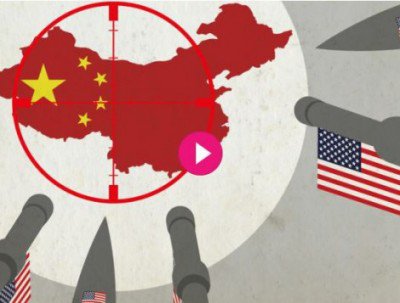US Policy Paradox: How to Lose Friends and Influence Nothing

When Paul Robeson belted out the lyric “I’m tired of living, and scared of dying,” he stumbled on to a paradox of emotional dissonance that could easily define the geo-strategic cognitive dissonance that the US exhibits when dealing with its fellow superpowers Russia and China.
Time and again the United States has shown that it does not want war with either of those countries, and these feelings are of course mutual. However, the US has a strange penchant for conducting provocative measures that inexorably harm relations with both Russia and China in mind-blowingly close proximity in time to moves suggesting rapprochement or, at minimum, de-escalation of tensions.
The most recent example is the Pentagon signing an agreement to open lines of direct communication with the commanders of the People’s Liberation Army to avoid “miscalculations” in areas ranging from the Korean Peninsula to the South and East China Seas.
In a rational environment, this would be seen as a US climb-down over actions China finds unacceptable in Korea and in its maritime waters. But in the current environment, while the US has signed an agreement that would ideally reduce tensions between the Chinese and US armed forces, the US president has also authorized his government to open an investigation into Chinese trade practices. While the proximate issue is US intellectual-property rights in China, the phrase “anti-Chinese sanctions” is on the tip of everyone’s lips.
Far from being out of character, the dichotomy of cooperating with China and engaging in a would-be pre-emptive trade war that the Chinese Ministry of Commerce has warned could be deeply dangerous is actually par for the course under the Trump administration.
On July 7, Donald Trump and Vladimir Putin met for the first time. The most meaningful outcome of the meeting was the agreement jointly to police a ceasefire and accompanying de-escalation zone in southwestern Syria, along with Jordan.
Less than a month later, Trump signed a sanctions bill against Russia that Moscow remains furious about. Détente 2.0 officially lasted from July 7 to August 3, 2017.
In respect of Iran, the Trump administration has quietly but officially stated that Tehran has not violated a single clause of the 2015 nuclear deal, but US officials continue to sanction Iran and continue to speak of Iran as though it has violated every agreement ever signed in history.
This has the aggregate effect of making the United States appear tired of warring but scared of cooperating.
In reality, neither Russia, China nor Iran wants war with the United States. One could also add North Korea, Mexico, Syria, Venezuela, Zimbabwe or just about every other country on the planet to that list.
Therefore, while moves to de-escalate military tensions are positive developments no matter where they happen, the mixed signals the US is sending will only serve as a demonstration that the US is not serious about proper de-escalation and cooperation and therefore it is only natural for the wider world to assume the worst about the United States, which far too often translates into “the tense status quo hasn’t changed”.
What’s more is that while pundits argue over whether this is part of a larger American geo-strategic plan to sow confusion or is simply an inexperienced Trump administration that cannot decide if it is coming or going, the wider world is more concerned with the effect than the cause.
In this sense, the US is less like the longing voice of “Old Man River” than it is like the author of a future worst-seller, “How to Lose Friends and Influence Nothing”.
Adam Garrie is a geopolitical expert with an emphasis on Eurasia. He is managing editor at theduran.com and weekly host of Digital Divides with Nedka Bablkku.

